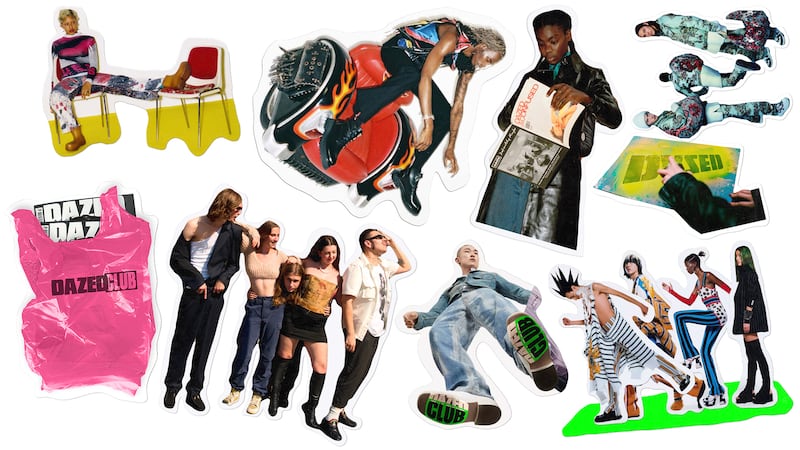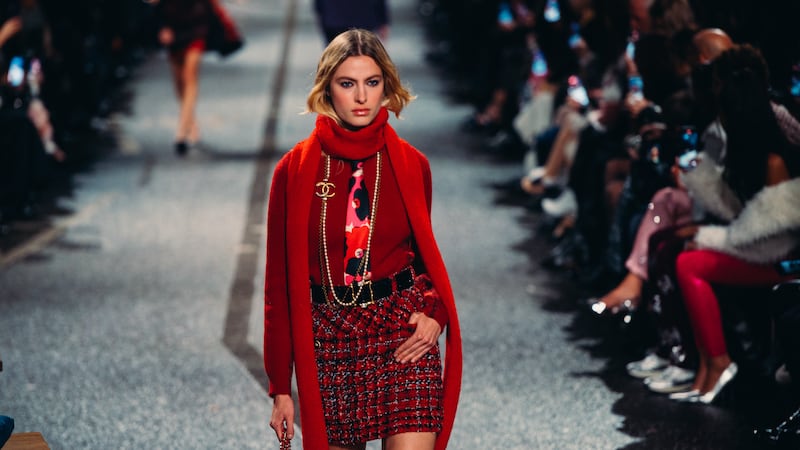The struggles of independent brands were front and centre this week.
On Tuesday, The Vampire’s Wife — purveyor of gothic-glam prairie dresses beloved by Kate Middleton and Florence Welch — said it was closing after a decade in business. By Friday, Dion Lee, the 15-year-old Australian label that has dressed Taylor Swift and Dua Lipa, had called in administrators.
The news came only days after New York-based designer Mara Hoffman said she was shuttering her label after 24 years in business and London designer Roksanda Ilinčić’s namesake label narrowly escaped administration after finding “white knight” investor The Brand Group.
For independent labels, perennial cash flow issues and a heavy dependency on wholesale orders from third-party retailers means their business foundations are shaky even in the best of times.
Now, they’re being pushed to the brink and beyond.
Roksanda said it had filed a notice of intent to appoint an administrator, citing “recent volatile market conditions,” before TBG came to the rescue. The Vampire’s Wife said the “dramatic implications” of “upheaval in the wholesale market” was a key factor in its closure.
“At the best of times fashion is still a risky business; when times are bad it makes it even more difficult,” said Vikram Menon, an accountant who works with several London-based labels under a British Fashion Council mentorship scheme.
A slowing luxury market is putting significant pressure on fashion businesses big and small. Even the likes of LVMH are being hit hard. But independent labels, most of which depend on third-party retailers for distribution, are also facing turmoil in the wholesale market.
In particular, the recent implosion of key stockist Matchesfashion, which was put into administration by new owner Fraser’s Group in March, has left small brands reeling.
Many are out of pocket for orders already shipped before the e-tailer went into administration. According to filings, The Vampire’s Wife and Roksanda are owed £32,000 and £9,000, respectively.
But it’s the wider loss of a key sales channel — and with it future orders, including lucrative specials and exclusives which many labels rely on to keep cash flowing — that likely hurts more.
And it’s not just Matches. The decline of key distributors Net-a-Porter and Farfetch-owned Browns has also weighed heavily on small labels, as has weakness in the department store sector.
Even buoyant retailers, many stuck with excess inventory after the end of luxury’s post-pandemic boom, are pulling back and taking fewer risks, opting mostly to stock brands with pristine sales records.
“It feels different than it did 10 to 15 years ago when it was exciting and retailers were willing to experiment with young talent and designers … Everyone’s more conservative,” said Gary Wassner, CEO of Hilldun Corp, a New York group that helps finance independent designers.
Seeing trouble in the wholesale market and the power of social media, some independent labels are rethinking their strategies and building direct-to-consumer channels, but the cost and complexity of acquiring customers and managing inventory, shipping and returns have made this path a struggle — even more so as would-be investors retreat from fashion.
The investor pull back has left many labels, already heavily in debt after the shocks of Covid-19, highly vulnerable. “You can’t just keep incurring debt; you can’t just wish that something is going to change and you’re going to get an injection of cash or find an investor,” said Menon.
Some labels may be able to walk the tightrope. “It is a struggle, but if brands are intelligent, careful and diligent on pricing and expenses, the opportunity is there for them,” said Wassner.
But for many, the current threat may prove existential.
“This is the most challenging environment since the global financial crisis,” said Stefano Martinetto, chief executive of Tomorrow London, a brand accelerator and distributor for independent labels.
“It’s sad but not surprising that many, and many more in the near future, will find their businesses completely unsustainable and will probably need to close down.”
THE NEWS IN BRIEF
FASHION, BUSINESS AND THE ECONOMY
Chanel defies luxury slowdown as annual sales surge to $20 billion. The French house reported revenues up 16 percent in 2023 and plans to increase capital expenditure by as much as 50 percent in 2024. Operating profits rose 11 percent to $6.4 billion.
Prada CEO not eyeing big acquisitions right now. “Our homework today is to nurture our brands,” chief executive Andrea Guerra said. Guerra said he expects more M&A activity in the industry over the next few years.
Ralph Lauren forecasts dull annual revenue. The apparel maker’s shares were down 4.5 percent in pre-market trade after the company also forecast current-quarter revenue growth below estimates. It expects annual revenue to rise in low-single digits, centring on about 2 percent to 3 percent, below market expectations of a 3.98 percent increase.
Lululemon’s product chief departure adds to “wall of worry”. Shares fell as much as 7 percent Wednesday after the company said its chief product officer, Sun Choe, was leaving, raising concerns among analysts that the athleisure brand is losing its edge. Lululemon’s stock had fallen 37 percent this year through Tuesday’s close.
Luxury stocks fall as Chanel hints at tougher times to come. The Euro Stoxx Luxury 10 Index fell as much as 1.9 percent, the most in about a month, after privately owned Chanel Ltd. published 2023 financial results. Luxury stocks have been volatile this year, with underwhelming updates and warnings.
Macy’s profit beats estimates as turnaround shows progress. The results will ease some pressure for chief executive officer Tony Spring and help convince shareholders and board members that he deserves more time to execute a turnaround strategy.
Temu-parent PDD Holdings beats Q1 revenue estimates. The company’s revenue rose 131 percent to 86.81 billion yuan ($11.99 billion) in the first quarter, compared with analysts’ average estimate of 75.66 billion yuan, based on LSEG data. PDD’s shares were up 5.7 percent in pre-market trading.
VF Corp misses quarterly revenue estimates and posts loss. Shares of the North Face owner were down nearly 8 percent in extended trading. Sales at VF Corp’s biggest brand Vans, which made up about 32 percent of the company’s total revenue in 2023, were down 26 percent owing to inventory clearance efforts in the wholesale channel.
TJX posts upbeat Q1 and lifts annual profit view on robust demand. The company lifted its annual earnings estimates to $4.03 to $4.09 per share from its prior forecast of $3.94 to $4.02. TJX reported a 6 percent rise in net sales from a year earlier to $12.48 billion for the first quarter ended May 4.
LVMH deepens relationship with Alibaba. The reinforced ties come as luxury companies redouble efforts to cater to shoppers in China, where demand has been dampened. As part of the agreement announced on Wednesday, LVMH will also gain access to technology from Alibaba Cloud, to help improve supply chain processes and customer insights, both companies said.
Celine releases 1960s inspired-menswear video. The “Symphonie Fantastique” video is the first menswear collection to be shown by Celine since a video released last November. The fashion films showcase Slimane’s deft skill as a stylist and photographer and have created an ultra-coherent image for Celine.
Buy Now, Pay later needs credit card-like oversight, CFPB says. The CFPB wants to ensure this sector, now a major part of the consumer credit market, is not “gaining an advantage by sidestepping existing regulations,” director Rohit Chopra said. The CFPB’s interpretation of the law will take effect in 60 days.
THE BUSINESS OF BEAUTY

E.l.f Beauty surpasses $1 billion in annual sales. The beauty company reported that sales increased 77 percent to over $1.02 billion for the 12 months ending on Mar. 31, 2024. The company’s share price fell after it reported that growth will likely decelerate in the coming fiscal year.
Indian beauty retailer Nykaa posts near three-fold jump in Q4 profit. Affluent consumers showed a preference for luxury makeup and fragrances which helped drive the 28 percent increase in revenue at 16.68 billion rupees ($200.27 million). Its earnings before interest, tax, depreciation and amortisation margin expanded to 5.6 percent from 5.4 percent a year ago.
Hims debuts $199 weight-loss shots at 85 percent discount to Wegovy. Hims can offer the prescription weight-loss drugs because US regulators have rules that allow pharmacies to make copycat versions of drugs in shortage. The company’s stock shot up as much as 38 percent on Monday, the biggest intraday move in more than three years.
Contact Sports shutters after one year in business. The sports-themed sex shop has laid off staff and is managing unsold inventory. The founders have decided to focus on other ventures that are growing more “significantly.”
PEOPLE

Dazed Media names new chief marketing officer. Sophie McElligott was promoted to CMO of Dazed Media; she joined the company in 2015 and most recently held the position of marketing and communications director. She will be responsible for overseeing the business’ global expansion and marketing strategy.
Bruce Nordstrom, former retailer chair, has died. Nordstrom was instrumental in the company’s expansion and its 1971 initial public offering. He was 90 years old.
MEDIA AND TECHNOLOGY

Lagardere moving closer on sale of Paris Match magazine to LVMH. Lagardere said the sale of Paris Match, which mixes coverage of current affairs with photos of celebrities and royalty, could be completed by the end of September. LVMH already owns financial newspaper Les Echos as well as daily paper Le Parisien.
Aura Blockchain Consortium says it has logged more than 40 million products. Among the physical items imbued with its digital identities are pieces from Prada’s Eternal Gold fine jewellery collection, Loro Piana’s linen André shirts, Rimowa suitcases and more than 800,000 items across OTB Group’s brand. The group’s CEO Romain Carrere called it a “milestone.”
Compiled by Yola Mzizi.
Editor’s Note: This article was updated on 28 May 20204. A previous version this article misstated the amount MatchesFashion owes The Vampire’s Wife and Roksanda. It is £32,000 and £9,000, respectively, not $32,000 and $9,000.

